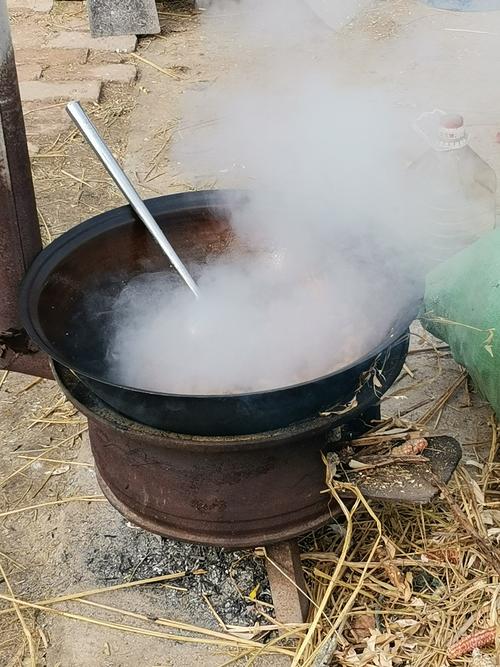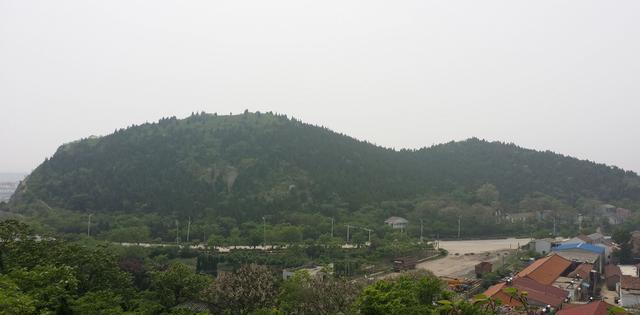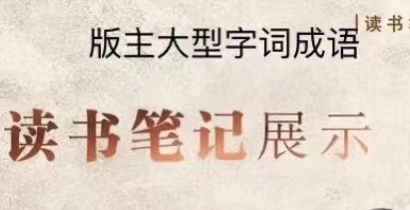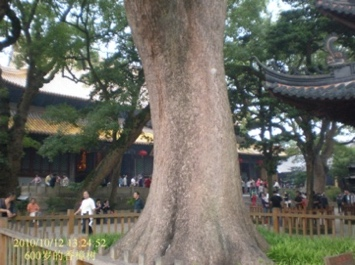One day of early August of 1970 we came to the Political Work Section of Tongshan County Revolutionary Committee to register. The county Party committee yard, as people called, was located in Kuishan (Mount Kui) in the south suburb of Xuzhou. From the receptionist we got to know that we were assigned to the education department and we had first to go to the countryside to receive re-education by the poor and lower-middle peasants in Maozhuang People’s Commune located in the southeast of the county. We looked at the map and discovered another commune, called Xuzhuang, which was close to a railway stop, but the students who registered earlier than us had already occupied all the positions. We had no choice but to go to Maozhuang farther away from the railway stop. As for to which production brigade we would go would be decided by the commune. After registration we came to the accountant office and only one person was there, who settled our registration fund and paid out our wages of August, each one 42.5 yuan, together 85 yuan, which was the first month salary for us. We thought the amount was somewhat large because in NJU we depended on the stipend, Zhang 15, three yuan more than me. Now we had salary every month and could support ourselves completely. In addition, we could carry out our filial duty, so we decided to send 10 yuan to Nantong and buy some present for my mother-in-law.
Starting was not smooth and we met some trouble going to Maozhuang. Our luggage was forwarded but when we got off on the stop nearest to Maozhuang, we were informed that the luggage could not get off on this small stop and we had to go to the next stop called Daxujia to pick it. How to get there? The local peasants used a kind of flatbed stepped by man’s feet to do business. We employed two flatbeds and sat on them, jolting along the country road to Daxujia. We picked our luggage and came back, arriving at Maozhuang. Meilan Zhang and other three girls were assigned nearby in the brigade called Shilou. I went to Wulou Brigade, 4 kilometres away with a student graduated from Nanjing Normal Institute, called Xuemin Tang. We began the life of receiving the re-education by poor and lower-middle peasants.
At the beginning of my life in the northern countryside I didn’t get used to a lot of things. Tang and I lived in a small house on the field for seed extraction which used to be a mill. The first meal was cooked by a village lady, staple food being wheat pancake (luomo in Xuzhou language) with flour water and the eggs frying with hot pepper, which I had never eaten before. The pancake had no oil or salt, which I felt no taste. In the flour water there was naturally no rice, which I didn’t like to drink. The pepper was too hot for me to taste. Seeing the yellow fried eggs, I could not eat a bit. Xuemin Tang, who was from Toshan County, said to me that the hot pepper fried with eggs was usually used to entertain the guest, but I could not appreciate the kindness rendered. Tang was a very amiable person, encouraged me to cook any food I liked and said that he could eat anything I made because he had been living in Nanjing for 4 years and got used to the southern food. We could buy rice from the grain administration centre and vegetables and meat on the market day. The price was not expensive. However, there was no stove like that in the house of my hometown, which was made of bricks with a chimney. A very simple of stove made of mud without a chimney was used to cook meals, smoking the cook to tears. Wheat straw was burned and the cook had to squat in order to breathe less smoke. The oil, salt, sauce and vinegar were put on the ground and the cooked food had smoke taste.

This Stove made of iron with a chimney; ours made of mud having no chimney
Tang let me stop working in the field earlier and go to our house to cook lunch, but I was afraid of being a cook. Our beds were netted with ropes and after a period of time, the ropes became loose and had to be tightened, which caused me to think of sentences Xueqin Cao wrote in Hongloumeng(The Dream of Red Mansion):windows made of grass stems, rafter of plant sticks, rope beds and tile cooker, which, I expected, would not freeze my mind and bosom. Meilan Zhang and three other girls were all from the north of Jiangsu and had the same taste interest. They cooked their meals in turn and didn’t felt it very hard. She was sure that I was not got used to the life and came to Wulou to see me several times, comforting and encouraging me. Fortunately, I was not afraid of the work in the fields and every day I went to work with the villagers, barefoot, having good relationship with them. The commune members and the head of the production team supported us and gave us the dried beanstalk for burning, lessen the smoke.
Xuemin Tang’s major was Chinese and he was a communist Party member. It was not long before he was reassigned to arrange an exhibition hall. I persisted in working in Wulou and continued to receive re-education. We began to talk about marrying so that Meilan could live with me in Wulou and could take care of each other, spending the two years in the countryside. I wrote to my parents, telling them that we would come home during the spring festival of 1971 and get married, and asking them to get ready.
Our marriage ceremony was held on the fourth day of the New Lunar Year. We had worked only half a year, saving only a little money. We bought two watches, mine 120 yuan, quakeproof and hers 100 yuan, not quakeproof. Parents made some new clothes, elder sister bought a new jacket for her sister-in-law and so so. We had not any gold and silver product, which I have had no knowledge about up to now. According to the custom of my hometown, relatives and friends came to congratulate us and parents asked a cook to make some dishes for guests to drink rice wine. Almost all relatives gave some money as present to Meilan. I thought that parents had spent a lot of money affording my education and our marriage ceremony made them careworn and worried. We should not want the money from the relatives and left it to parents, which Meilan supported completely. I remembered that on the evening of our marriage, mother was extremely happy because she thought that the second daughter-in-law was picked up and she had not spent any money buying gift to daughter-in-law’s family. In addition, she didn’t want any present money from the relatives. Parents’ happiness made us cheerful because we knew that there were one brother and two sisters for them to continue to support. We were determined not to add to the burden of parents because of our marriage. We were confident that as time went on we would have all that we needed.
Now in Xuzhou, I should introduce something in detail about Meilan’s Zhang family. Her home is lying in the northern suburb of Xuzhou at the foot of Pipa Mount. Pipa is a kind of Chinese musical instrument. The shape of Pipa Mount is very much like a Pipa. If you don’t believe, you can go there and have a look. My father-in-law’s name was Xiaozeng Zhao, as old as my father, also born in 1914. In the winter of 1948 when he was 34, the Huaihai Compaign between National Party and the Communist Party broke out and he was called by the head of the village to transport war material for National Party military, missing and disappearing. Mother-in-law was told that they had gone to the southwest and she went to Xiao County, trying to find him, vain. The whole region was in the turmoil of war and National Party army was surrounded in the village called Chenguan by the Liberation Army for more than 20 days, starving and freezing to death innumerably. The commander-in-chief, Yiming Du, was captured alive. How could a temporary transporter preserve his life? As a result, three children became the heavy burden on two widows, mother-in-law and granny-in-law: elder brother, 7; Meilan, 4 and younger brother, only 1. How hard it was! Two years later, her elder brother died of smallpox sickness. Granny was already more than 60. Meilan and her brother were brought up mainly by their mother alone.
At the foot of Pipa Mount there were two villages, one in the west and the other in the east. Mother-in-law’s maternal home was in the west village. When she came to Zhang’s home, she was still a young girl, a child bride. She was born in 1920, also monkey year, 24 years older than Meilan.

Xuzhou Pipa Mount
Dec. 12 2008 in Melbourne
Proofreading on Feb. 5, 2012 in Chicago









